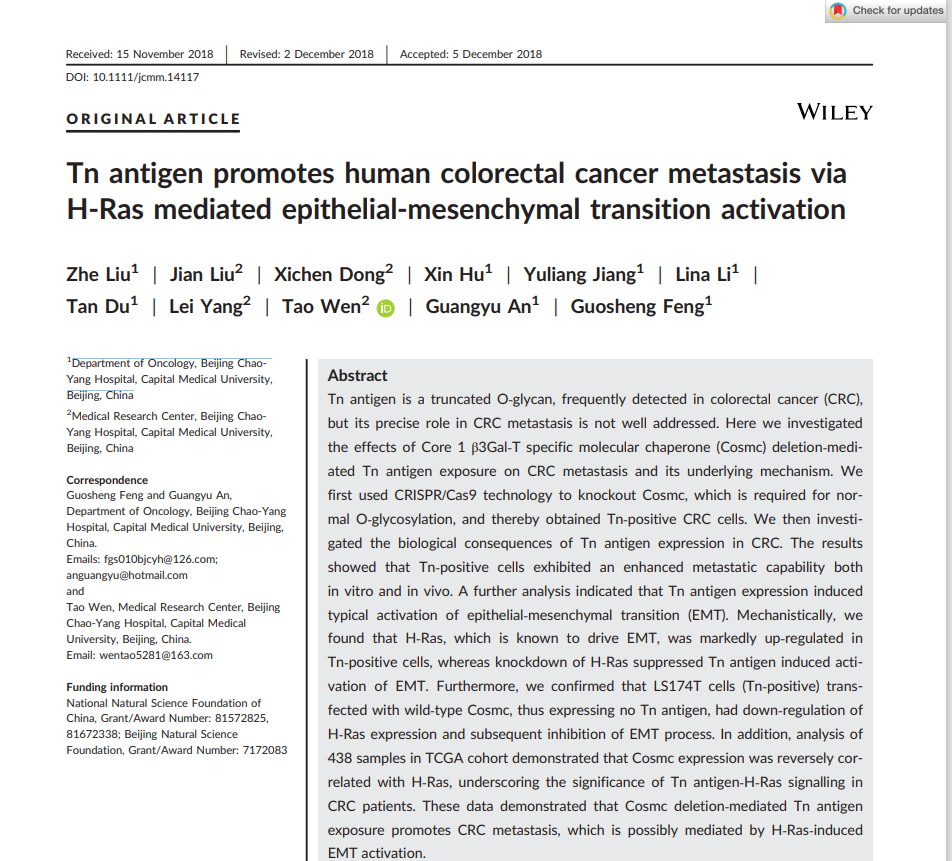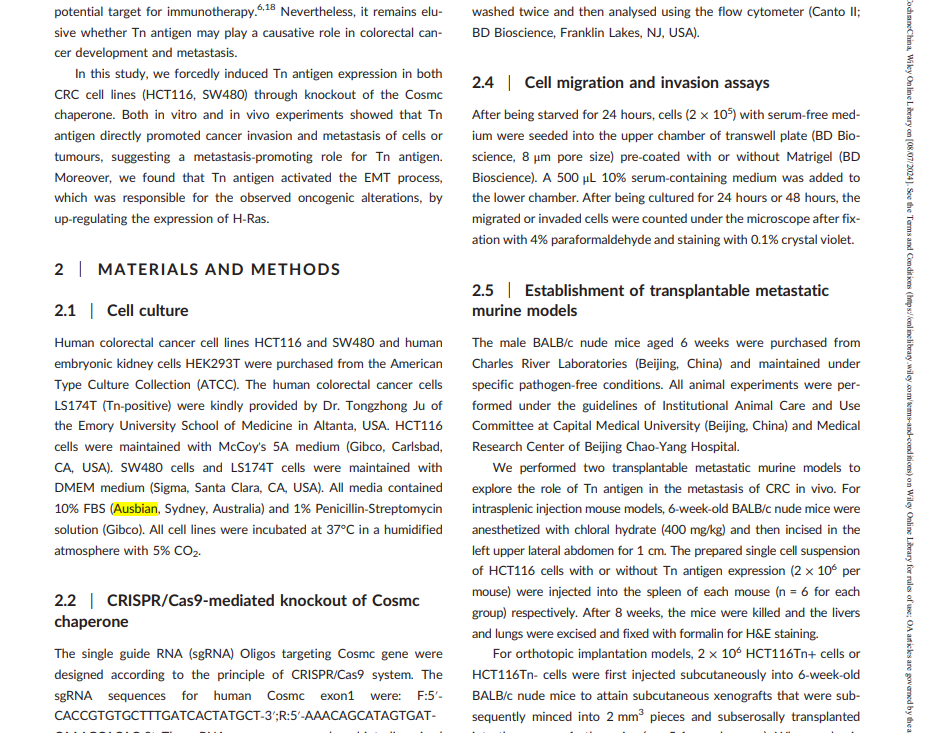Tn抗原通過H-Ras介導的上皮-間質轉化激活促進人類結直腸癌轉移 二維碼
發表時間:2024-09-03 14:29 2019年11月,首都醫科大學附屬北京朝陽醫院腫瘤科;首都醫科大學附屬北京朝陽醫院醫學研究中心(Department of Oncology, Beijing Chao Yang Hospital, Capital Medical University,Beijing, China;Medical Research Center, Beijing Chao Yang Hospital, Capital Medical University,Beijing, China) Tao Wen老師研究團隊在《JOURNAL OF CELLULAR AND MOLECULAR MEDICINE》上發表論文: “Tn antigen promotes human colorectal cancer metastasis via H-Ras mediated epithelial-mesenchymal transition activation” “Tn抗原通過H-Ras介導的上皮-間質轉化激活促進人類結直腸癌轉移” Abstract: Tn antigen is a truncated O-glycan, frequently detected in colorectal cancer (CRC), but its precise role in CRC metastasis is not well addressed. Here we investigated the effects of Core 1 β3Gal-T specific molecular chaperone (Cosmc) deletion-mediated Tn antigen exposure on CRC metastasis and its underlying mechanism. We first used CRISPR/Cas9 technology to knockout Cosmc, which is required for normal O-glycosylation, and thereby obtained Tn-positive CRC cells. We then investigated the biological consequences of Tn antigen expression in CRC. The results showed that Tn-positive cells exhibited an enhanced metastatic capability both in vitro and in vivo. A further analysis indicated that Tn antigen expression induced typical activation of epithelial-mesenchymal transition (EMT). Mechanistically, we found that H-Ras, which is known to drive EMT, was markedly up-regulated in Tn-positive cells, whereas knockdown of H-Ras suppressed Tn antigen induced activation of EMT. Furthermore, we confirmed that LS174T cells (Tn-positive) transfected with wild-type Cosmc, thus expressing no Tn antigen, had down-regulation of H-Ras expression and subsequent inhibition of EMT process. In addition, analysis of 438 samples in TCGA cohort demonstrated that Cosmc expression was reversely correlated with H-Ras, underscoring the significance of Tn antigen-H-Ras signalling in CRC patients. These data demonstrated that Cosmc deletion-mediated Tn antigen exposure promotes CRC metastasis, which is possibly mediated by H-Ras-induced EMT activation. 摘要: Tn抗原是一種截斷的o聚糖,在結直腸癌(CRC)中經常檢測到,但其在結直腸癌轉移中的確切作用尚未得到很好的解決。本研究探討了core1 β3Gal-T特異性分子伴侶(Cosmc)缺失介導的Tn抗原暴露對結直腸癌轉移的影響及其潛在機制。我們首先利用CRISPR/Cas9技術敲除正常o糖基化所需的Cosmc,從而獲得tn陽性的CRC細胞。然后我們研究了Tn抗原在結直腸癌中表達的生物學后果。結果表明,n-陽性細胞在體外和體內均表現出增強的轉移能力。進一步分析表明,Tn抗原表達誘導典型的上皮-間質轉化(EMT)激活。在機制上,我們發現已知驅動EMT的H-Ras在Tn陽性細胞中顯著上調,而敲低H-Ras則抑制Tn抗原誘導的EMT激活。此外,我們證實轉染野生型Cosmc的LS174T細胞(Tn陽性)不表達Tn抗原,從而下調H-Ras的表達,從而抑制EMT過程。此外,TCGA隊列中438個樣本的分析表明,Cosmc表達與H-Ras呈負相關,強調了Tn抗原H-Ras信號傳導在CRC患者中的重要性。這些數據表明,Cosmc缺失介導的Tn抗原暴露促進結直腸癌轉移,這可能是由h - ras誘導的EMT激活介導的。 該論文中,人結直腸癌細胞系HCT116和SW480以及人胚胎腎細胞HEK293T的體外培養是使用Ausbian特級胎牛血清完成的。欲了解或購買Ausbian特級胎牛血清可以聯系北京締一生物400-166-8600.
|
|





